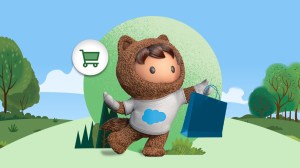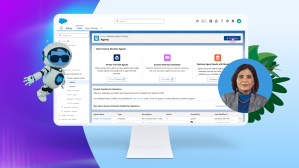Businesses rely on personalized digital experiences — from a special offer sent to a customer after they’ve browsed certain products, to the platforms they provide to contact customer support.
But for many companies, there’s a hidden cost of personalization: creeping out consumers with invasive ads and offers that trade on people’s personal data in unexpected ways.
As consumers grow more aware of data privacy, their peace of mind is essential to unlocking the benefits of personalization. Salesforce calls this ethical personalization: digital experiences built to enhance trust.
But just how much is ethical personalization worth? We engaged with tech industry analyst firm Valoir to research how consumers and professionals alike feel about today’s data policies and practices. Using survey responses and in-depth interviews with CIOs, CMOs, privacy and legal leaders, and other specialists who do this work every day, Valoir dug into the gap between consumer data and the companies that utilize it — revealing just how much value can come from empowering their efforts with ethical tools and services.
Consumers want their data handled ethically
More than one in five consumers worry about how their personal data is used or sold.
That’s according to Valoir’s 2022 Customer Experience Survey. And in its latest report, the analyst says this is a major problem for businesses.
Consumers want personalized experiences — but not at the expense of their privacy. One in three consumers, the new report also says, believe marketing has gotten “way too creepy” and only one in four understand how cookies work. And yet, 3 in 10 say they are willing to share data with companies, provided they get value in return.
Striking the right balance between personalization and privacy can be a daunting challenge for many businesses – especially as regulators introduce new and inconsistent guidelines.
“Marketers are increasingly challenged to deliver engaging personalization and ensure customer data is managed ethically,” says the report’s author, Rebecca Wettemann. “We found that, without the right software in place to ensure data is managed properly, companies are draining marketer and developer productivity, losing valuable data, and missing out on opportunities to build better relationships with customers.”
Ethical personalization can unlock savings
So, what can organizations do to stay connected with their customers in a trusted and efficient way? The report finds that personalization and privacy don’t have to be at odds, and that companies can actually unlock value and savings from implementing data ethics. Here are four key insights uncovered by the data:
- Organizations must clearly communicate data policies and practices. 10% of consumers say they’re more likely to buy from companies with clear data privacy policies. By creating consumer-facing policies in simple, understandable language, companies can build trust and maximize engagement with their customers.
- Decreasing the “data management tax” can free up marketers’ time. Based on a conservative estimate, marketers dedicate 8 to 12 percent of productive time to inefficient data management – or as many as 3-5 hours of a 40-hour work week. By carefully designing the way data are collected in the first place, organizations can cut this productivity tax and free up teams’ time to deliver personalized experiences instead.
- Keeping more first-party data is crucial. On average, companies lose 8% of their first-party data due to time spent cleaning, preparing, and managing. First-party data is often discarded due to imprecise data governance tools and processes. By improving tools and communication with customers about data collection, organizations can avoid throwing away this valuable information.
- Outsourcing data management creates efficiencies. Valoir estimates that up to 10% of developer time will soon be required to address complex ethical and privacy compliance requirements. By outsourcing to third-party software providers like Salesforce, developers can save time and marketers can better manage their data. That adds up to as many as 40-50 hours of unlocked engineering capacity.
Salesforce puts privacy first in personalization
Salesforce believes data has incredible value, so long as it’s used ethically and responsibly. Guided by the company’s Office of Ethical and Humane Use, Salesforce builds safeguards and protections into products and practices from the start, partnering with engineering and product teams to consider the privacy implications from the ground up.
Salesforce also works closely with customers, including sales teams and customers, advising on thoughtful data collection and helping companies deliver remarkable experiences for their consumers – all while deepening trust.
Ultimately, putting privacy first maximizes value for both businesses and consumers. Privacy and personalization can work hand-in-hand — with the right mindset, partners, and technology.
###
For more insights on the value of ethical personalization, check out the full report here. You can also learn more about ethical marketing principles and best practices in Salesforce’s Trusted Marketing and Ethical Personalization Trailmix.



















